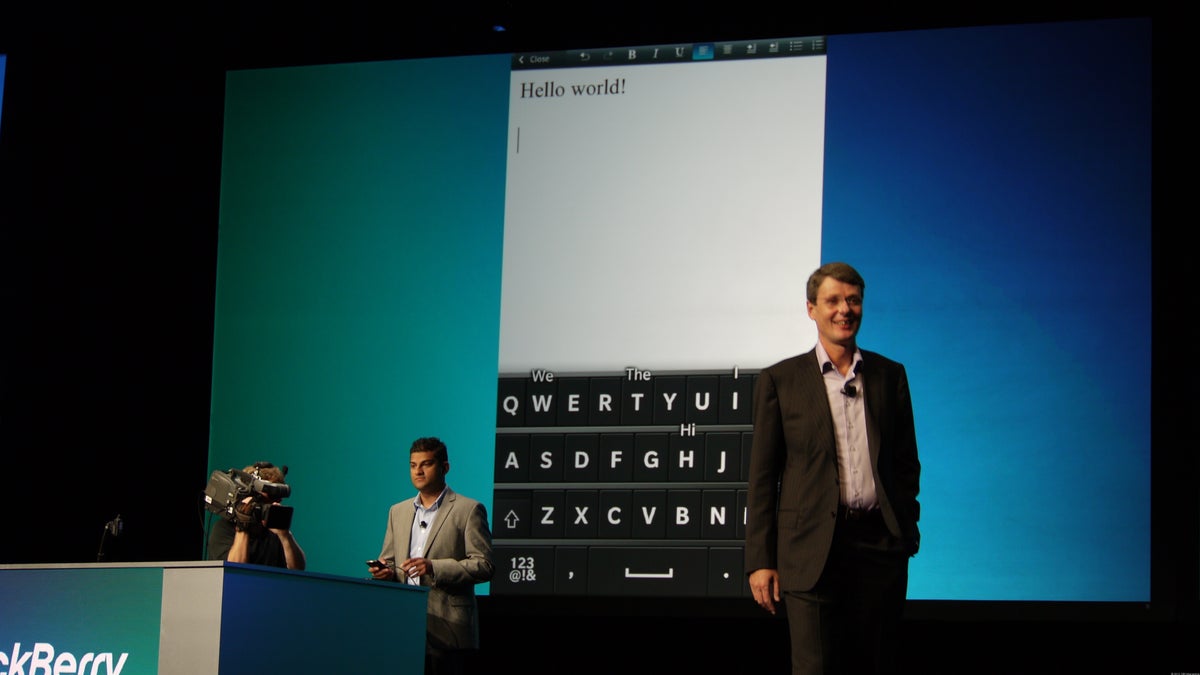RIM CEO: We're not abandoning BlackBerry physical keyboards
CEO Thorsten Heins met with reporters at the company's annual conference and clarified RIM's position on its physical keyboard.

ORLANDO, Fla. -- Research In Motion is not killing off its physical keyboards, according to CEO Thorsten Heins.
Heins, who addressed a room full of journalists and bloggers at the company's BlackBerry World conference here, said he wanted to clear up confusion based on the company's unveiling of the BlackBerry 10 software. It was widely reported or intimated that RIM may be getting rid of its physical keyboard, he said.
One of the highlights of the yet to be released BlackBerry 10 software is the intelligent virtual keyboard that takes touch-screen keypads to a new level. The software not only learns the words users use most often, but it also learns how people type on the device and compensates for sloppy typing. Ultimately, this makes typing much more accurate, something that has been a big problem with other virtual keypads.
But Heins reassured the audience that RIM is not getting rid of its tried-and-true physical keys.
"We never stated that we wouldn't build BlackBerry 10 devices with physical keyboards," he said. "We know what our strengths are. And it would be plain wrong to get rid of the physical keyboard."
Heins went on to say that the BlackBerry Dev Alpha device that the company showed off during the presentation yesterday was just one possible form factor for the upcoming BlackBerry 10 devices. He said that the press and BlackBerry fans shouldn't view this as the form factor of the final product. He stopped short of promising a physical keyboard on the first BlackBerry 10 devices, which are expected to ship later this year. But he said that the physical keypad will be part of BlackBerry 10 devices in the future.
Heins also reiterated that the software that was shown off during the demonstration is just the beginning. It is not the final software.
"We want the the BlackBerry 10 to be perfect," he said. "There's much more to come."
Heins also offered some information about the company's direction for its tablet, the BlackBerry Playbook. The Playbook, which was announced about a year ago, has struggled in the market and is seen more as a development device for what is to come from RIM. The device runs software based on QNX, which is also being used to fuel BlackBerry 10 software. Apps developed for the Playbook will be compatible with BlackBerry 10 devices. The company has seen some uptick in development for the Playbook, but it is still a niche product.
Heins said that he doesn't view the Playbook as a tablet per se, but as a step toward developing a computing platform. He said that the device will have 4G LTE network support this year. The device currently only connects to the Web via Wi-Fi. Heins also said that RIM will be pushing the Playbook for business users. And it will later address the consumer market.
Heins also took the opportunity to clear up confusion about the company's market strategy. He said the company is not abandoning the consumer market, as some news outlets reported after one of the company's recent conference calls. Instead, he said RIM will not try to develop its own consumers services and apps. And it will work with third-party providers for those features and apps.
RIM has been struggling the last few years to keep up with competitors Apple and Google Android. The company has steadily been losing market share, especially in the U.S. market. Heins, who took over as CEO a few months ago after the company's co-CEOs quit, blamed much of this slip on the fact that the company had been growing so quickly. He said that when he was hired in 2007, there were just over 6,000 employees. And now the company has more than 20,000 employees.
He said the company lost its focus. But now his plan for RIM is to refocus the management team and the business.
"I want us to be so laser-focused we melt steel," he said. "We've had some fat on our hips. But we need to be a lean, mean, fighting machine."
As for the loss of market share in the U.S., Heins said that he believes BlackBerry 10 will get the company back in the game in North America.
"I am convinced that with BlackBerry 10, we will once again be a strong contender in the U.S.," he said. "We will regain market share in the U.S. We are here to win, and we're not here just to be in the game."

